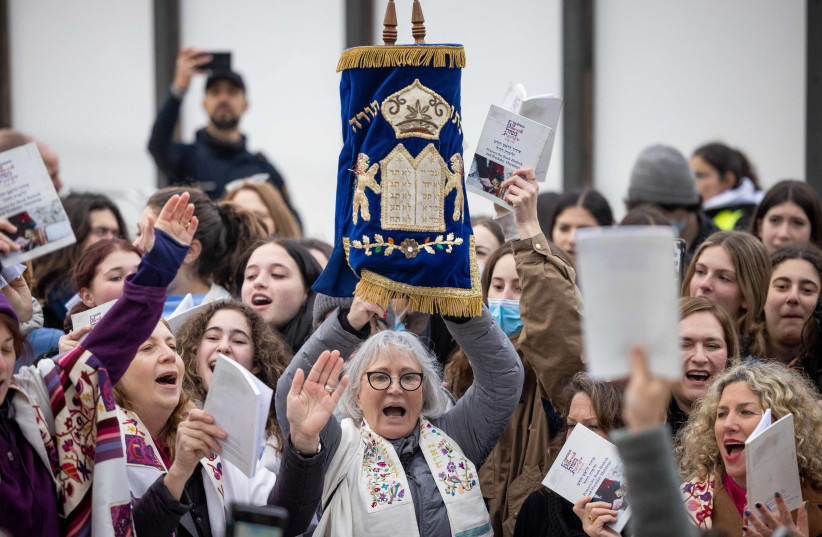In recent weeks and months, the devastating scenes from Israel have underscored a stark reality: the brutality of war and the emotional toll it exacts on those directly affected. Over 1,200 people were murdered in Israel on October 7 by Iranian-backed Hamas terrorists in Gaza.
For many Jews around the world, this reality has clashed with an entrenched adherence to religious rules, illustrating a profound disconnect between the theoretical and the practical applications of Jewish law during war and other emergencies.
Take, for example, a distressing incident involving a Jewish man from New England. His children, living in Tel Aviv, were huddling in an air raid shelter amid a barrage of missiles and rockets by Hamas.
In this life-threatening situation, the father kept his phone on during Shabbat in his Conservative synagogue, responding to his children’s desperate calls for comfort as explosions were heard outside. The urgency of his family’s plight was compounded by real-time alerts on his emergency rocket app of incoming missiles.
Yet, in a tragic twist, an elderly synagogue member chastised him for violating Shabbat laws, leading to the intervention of the synagogue president and the police, who removed him from the synagogue for receiving a call from his children. The synagogue’s rabbi was on vacation and not on the scene to create a bridge of understanding.

This tragic incident highlights a troubling gap in understanding and empathy within certain segments of the Jewish community. Jewish law, rooted in the principle of “pikuach nefesh” (the preservation of life), allows for the suspension of certain religious prohibitions when faced with life-threatening emergencies.
In the context of an active war zone, where lives are at stake, the use of electronic devices for communication and safety is not just permissible; it is imperative.
THE RIGIDITY displayed by some members of this New England synagogue underscores a broader issue within our community: a lack of education and sensitivity regarding the application of Jewish law in crises.
This rigid interpretation fails to recognize the essence of Jewish teachings, which prioritize human life and compassion above all else. The situation also exposes a broader systemic issue. Jewish Federations and synagogues must do more to educate American Jews about these critical aspects of Jewish law. A nuanced understanding of religious practice during wartime is not merely academic; it has real, profound implications for the well-being and emotional support of our community members.
The act of turning away a distressed father, who was trying to offer support to his children in the midst of a life-threatening situation, reflects a deep-seated lack of empathy. It’s a failure to grasp that during times of war, the primary concern should be the safety and emotional well-being of individuals facing unimaginable fear and danger.
Such incidents can inadvertently foster divisions and resentment within the Jewish community and may even contribute to broader societal issues, including antisemitism. If Jews don’t get it – why should Christians and Muslims?
One Conservative rabbi wrote this me: “With all due respect, I cannot agree that Israel’s reality of war trumps a community’s Shabbat practices. As much as we American Jews share in the mission and realization of the modern State of Israel, their current reality is not our current reality.
“One is allowed to have their phone with them, but the ringer must be off if that is the synagogue’s general Shabbat practice. People come to synagogue to be away from the reality of what is going on for a few hours. It is not right for an individual to impinge on that right.”
EVERY JEW should be aware of the gravity of the current situation in Israel, where thousands have been affected by violence and terror. We should be embracing and confronting our shared reality. Why resort to punitive measures or rigid enforcement of religious rules? Our response should be one of compassion and understanding.
Offering support, empathy, and comfort should take precedence over adherence to ritualistic details when lives are at stake.
These are the questions that need to be adressed
How many Jewish Americans were murdered by Hamas on October 7?
How many Jewish Americans were taken hostage?
How many US military lives have been lost today?
How many are risking their lives on US aircraft carriers in the region?
The global Jewish community must reassess how it handles religious observance in the face of emergency situations. A more empathetic and informed approach would not only align better with the core values of Jewish law but also strengthen our communal bonds and our capacity to support each other in times of crisis.
We need hugs and prayers for the release of the 108 hostages being held in Gaza, not the police escorting Jews from an American synagogue minutes after carrying Torah.
The writer is president of Leyden Communications Israel and JewishPr.co, a crisis communications, public affairs, and digital PR organization with offices in New York and Ra’anana. He has served as an officer in the IDF Spokesperson’s Unit and as a senior media and cross-cultural communications consultant to the Foreign Ministry.
